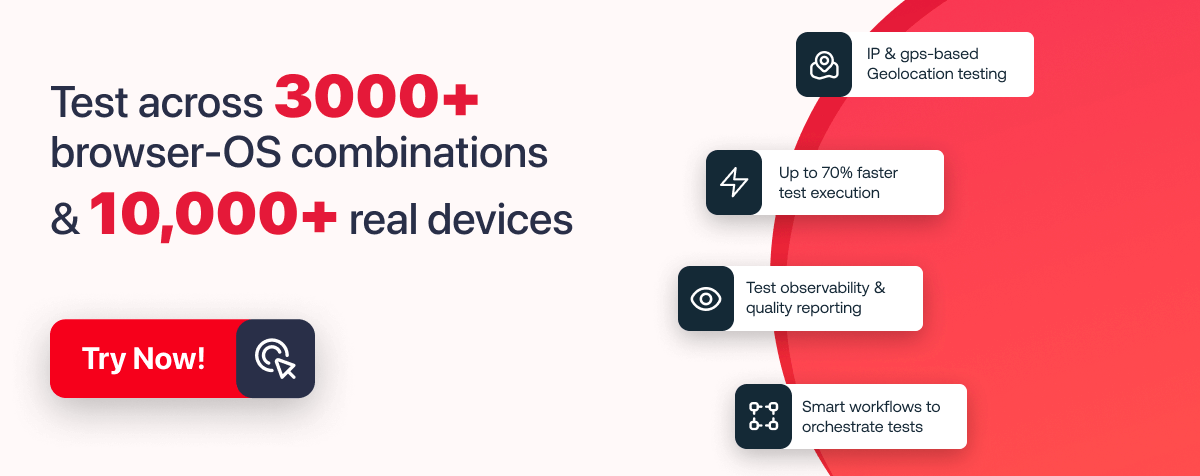21 Free Test Management Tools And Their Features [2025]
Nazneen Ahmad
Posted On: March 26, 2025
![]() 377162 Views
377162 Views
![]() 26 Min Read
26 Min Read
Software testing is an integral part of the Software Development Life Cycle (SDLC), which identifies bugs or issues in software applications and ensures they are fixed and resolved on time. This process involves various activities, such as test planning, writing test cases, and developing test scenarios.
The test activities must be managed effectively to ensure the software development does not fail. However, some of the reasons for software failure could be poor documentation, premature release, lack of resources, restricted time for testing, and more. They arise due to inadequate test management.
Test management is the process of organizing and controlling all test-related activities to ensure the development of high-quality software applications. Various free test management tools are available to help manage both manual and automated test approaches. Using test management tools, you can closely monitor each step of the test process and keep track of them using a centralized dashboard.
In this blog, we will learn about some free test management tools to help you manage and organize your test-related activities effectively.
Let us begin by first understanding test management and test management tools.
TABLE OF CONTENTS
What is Test Management?
Test management is the process of managing all the testing activities while developing software applications from their initiation to completion. This process involves organizing, controlling, tracking, and monitoring the test process to develop bug-free software applications. In turn, this allows for easy execution of the software testing process.
Some of the benefits of test management include the following:
- It speeds up the testing process to enhance efficiency and allow quick release of software applications.
- It manages each testing process in detail and aligns it with business requirements.
- It includes test planning and allocating resources effectively, including human resources, testing tools, and testing environments.
- It allows project stakeholders to monitor progress, identify bottlenecks, and make informed decisions, particularly for larger projects.
- It increases the likelihood of detecting and rectifying bugs in the testing stage.
What Are Test Management Tools?
Test management tools are software solutions that provide capabilities for arranging, performing, and monitoring various testing procedures. They also offer a structured framework for managing test cases, defects, and reporting, meeting the requirements of both software development and quality assurance teams.
These test management tools have publicly accessible source code, enabling modification and sharing. They facilitate various software testing activities, such as planning test cases, executing tests, tracking defects, and generating reports on testing progress.
The advantages of using test management tools include:
- They are user-friendly and have a simple user interface.
- They allow multiple user access with specific permissions for different projects.
- They allow complete visibility and traceability of the testing process.
- They integrate with test automation tools and CI/CD tools like Jenkins, Bamboo, etc.
- They adapt quickly to Agile and Waterfall methodologies.
- They monitor the overall progress and QA metrics of the project.
- They serve as a centralized platform for all phases of testing activities.
Now that we have learned about test management and the advantages of having a test management tool, we will learn about some free test management tools that can be used to manage test-related activities in the section below.
Free Test Management Tools
Although there are various test management tools available, we have picked 21 free management tools that you can consider using based on your project requirements in 2025.
Some of the free test management tools are the following:
LambdaTest
LambdaTest is an AI-native test orchestration and execution platform to run manual and automated tests at scale with over, 5000+ real devices, browsers and OS combinations. It provides a free test management solution that allows developers and testers to streamline test authoring, management, triggering, and reporting through a unified Test Manager, enhancing efficiency across all testing stages.
The platform offers a comprehensive overview of testing progress and outcomes and facilitates tracking, managing, and accelerating the software release cycle.

The key features of the LambdaTest free test management tool are:
- It allows you to easily create and manage test cases using Test Manager’s intuitive hotkeys. Also, you can add detailed steps, actions, and essential specifics for a customized workflow.
- It allows you to improve your test step process with Generative AI, where you can automatically generate the next step by leveraging the existing test steps and test cases.
- It allows you to seamlessly import your existing test cases using API or CSVs using an automated mapping technique, ensuring that all fields and values are mapped effortlessly.
- It enables you to view your created test cases through advanced search and filtering capabilities, facilitating quick identification and access to the necessary test cases, thereby boosting and optimizing the efficiency of your testing cycles.
- It allows you to efficiently build targeted test plans by selecting test cases, assigning configurations, and assignees. You can broaden your testing with multiple configurations per case and monitor performance with a detailed build history.
- It lets you track test plan performance and manage test outcomes with a comprehensive build history. You can assign pass, fail, or skip statuses to test cases and attach evidence directly. It also lets you view overall test case results across desktop and mobile.
- It allows live viewing of test steps and tracking manual test durations for optimal efficiency. It also enhances your testing with automatic evidence creation and the ability to attach screenshots and videos on the go.
To learn more about this platform, watch the detailed video tutorial and get started with LambdaTest.
Qase
Qase is a free test management tool that addresses manual and automated testing needs. It allows tracking and reporting, expediting the delivery of high-quality software. It facilitates integration with computerized tests via REST API, enabling direct posting of results to the application. This functionality is available in the free plan subscription, which includes API access.
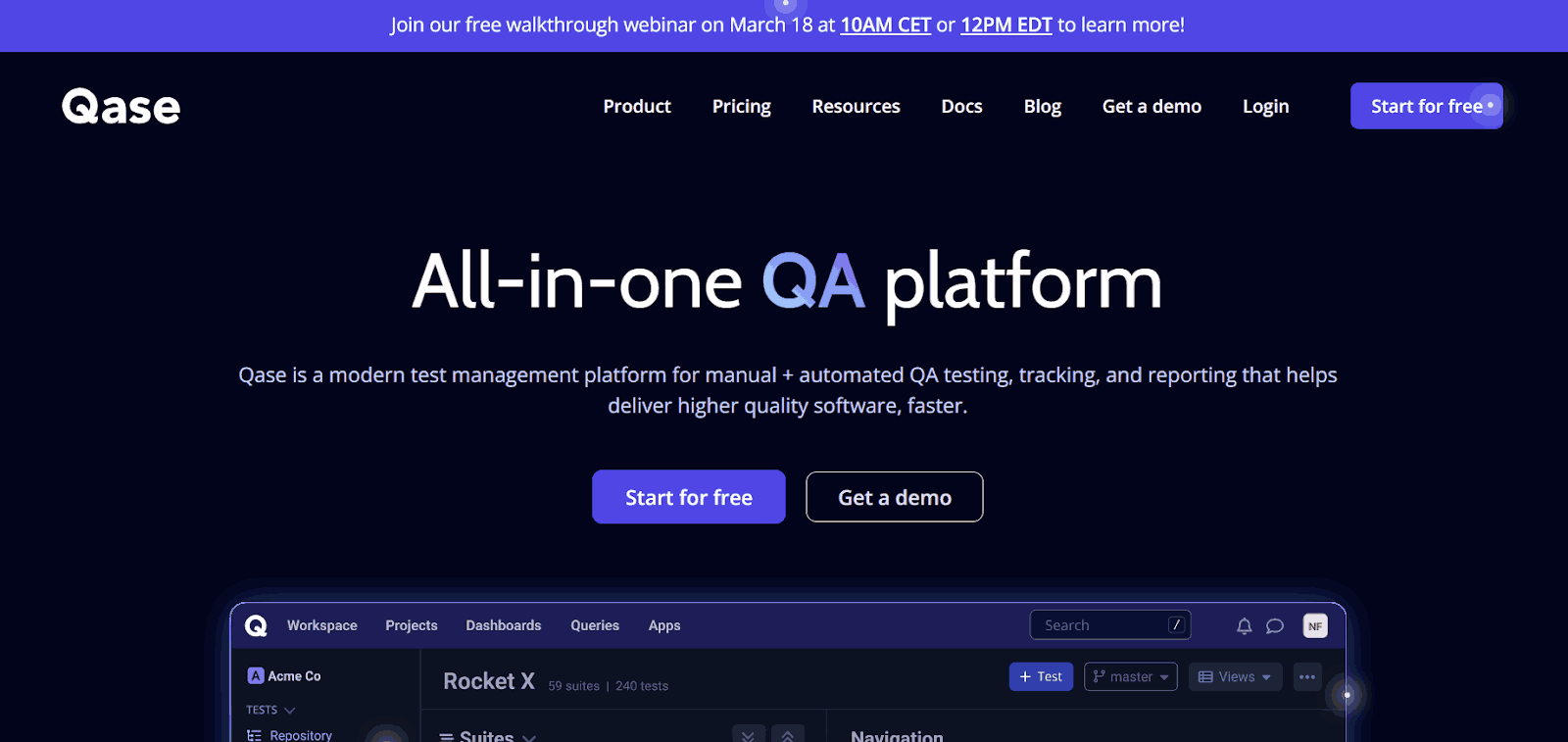
The key features of the Qase free test management tool are:
- It provides native integrations with leading automated testing frameworks and tools.
- It offers numerous integrations with third-party software, including Jira, Github, and Slack, with more to be added.
- It completes tests exceptionally fast, up to 60 times quicker than other tools, with real-time results.
- It utilizes AI capabilities to convert manual tests to automated ones, supporting ten languages and frameworks.
- It supports custom fields for test cases, defects, and runs.
- It offers shareable, easily understandable reports covering every phase of the testing cycle to facilitate data-informed decision-making.
Testomat
It is one of the popular free test management tools that prioritizes the efficiency of the automation testing process. It serves as a manual and automated test management application, offering solutions for both manual and automated testing.
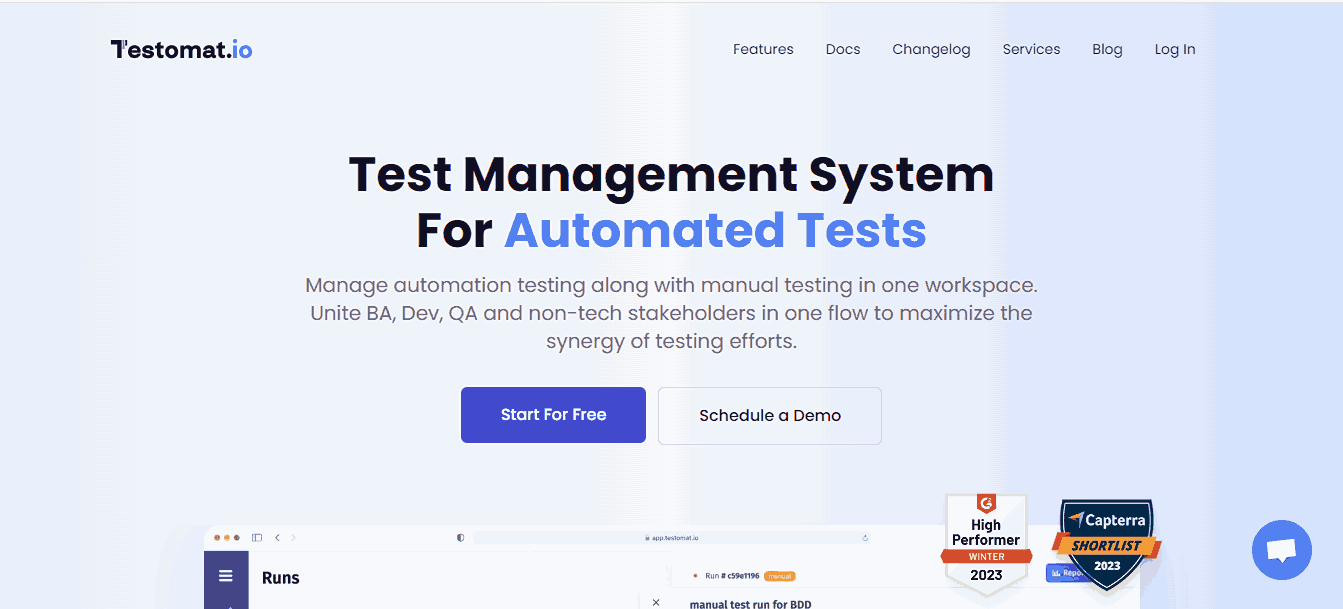
The key features of the Testomat free test management tool are:
- It incorporates a built-in importer for swift loading of all tests.
- It features a real-time reporter that ensures the visibility of tests, presenting them seamlessly in a unified view for both manual and automated testing.
- It integrates with various test automation frameworks, including Selenium, Cypress, Playwright, Jest, Mocha, Cucumber, WebdriverIO, TestCafe, Codecept, and CI/CD tools.
- It enables integration with popular automation testing frameworks, CI/CD tools, and third-party bug-tracking tools like Jira.
- It offers a user-friendly interface that facilitates initiating new testing projects and managing existing projects, including planning and executing regression testing.
QATouch
It is a modern and rapidly growing free test management tool designed for managing test cases. It has a user-friendly interface. However, its capabilities are limited to two users and three projects, providing access to only 100 test cases, 25 test runs, and 10 reports and allowing for only two custom fields under a free plan.
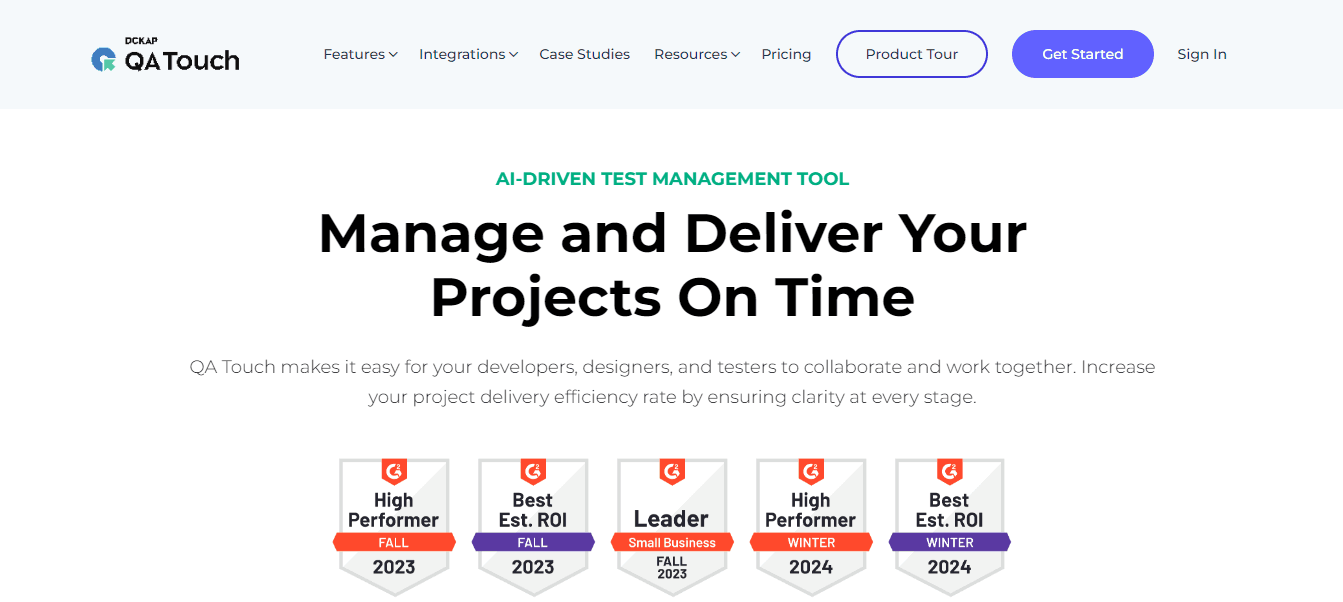
The key features of the QATouch free test management tool are:
- It manages projects, their releases, test cases, and issues in a singular repository using a structured approach.
- It uses the built-in enterprise defect module to log, categorize, and track each bug from incidence to closure.
- It provides a general overview of the software project’s testing progress.
- It can generate distinct general and managerial reports, ranging from test cases to releases, and seamlessly communicate them to project stakeholders via email.
- It integrates into the development process by linking requirements and defects.
- It establishes organization-specific roles for team members, with project-based and feature-based visibility levels.
QACoverage
It is a free test management tool that provides project management solutions, including test design, test automation, test execution, reporting and dashboard, requirement management, and Agile modules, streamlining the workflow for quality assurance teams. It is also Software as a Service (SaaS) test management software. Regarding available free options, the user limit is capped at three users, and up to three projects are supported, with project storage fixed at 100 MB.
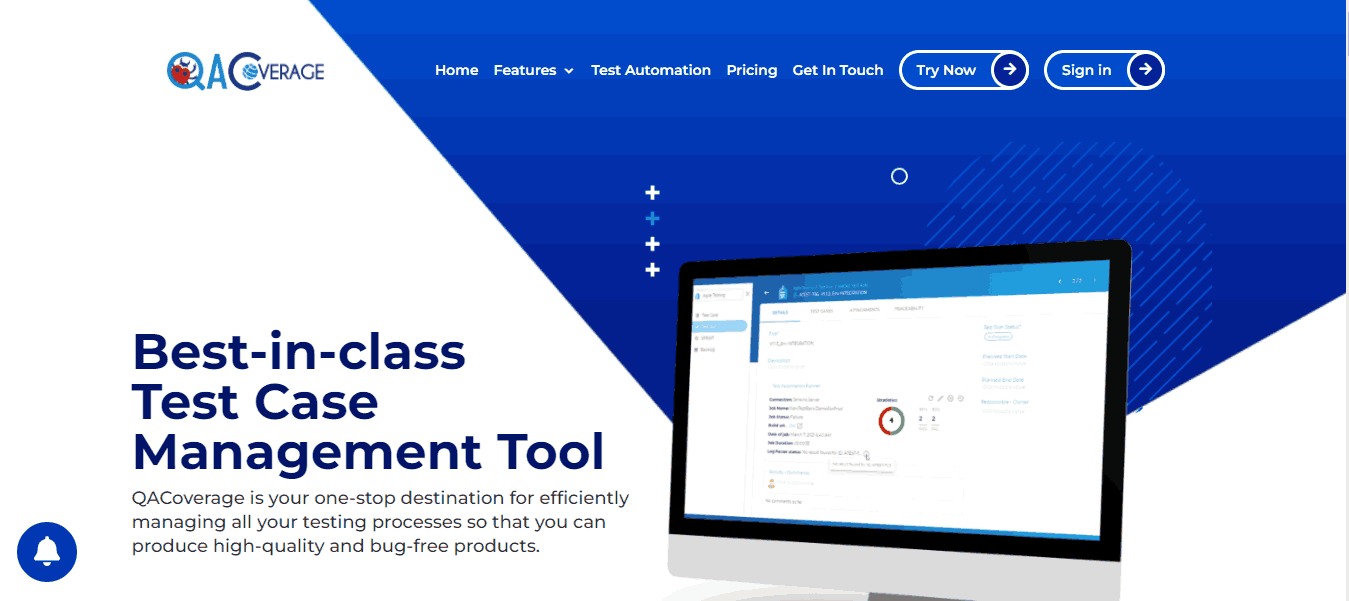
The key features of the QACoverage free test management tool are:
- It emphasizes manual testing and excludes support for automation features and CI/CD integrations in its free version.
- It offers a built-in ticket repository.
- It allows users to create unlimited test cases and test runs, distinguishing it from other test management applications. It includes incorporating test reports, filters, and run groups.
- It allows testers to reuse the test cases and other resources in diverse software projects.
TestCollab
TestCollab is a free test management tool that facilitates the organization of QA processes and promotes collaboration within the QA team. It is designed for use by three team members and allows for their assignments through a test plan. It eliminates the need for manually assigning test cases for each test. Furthermore, team members can create task lists to organize their daily tasks and work functions efficiently.
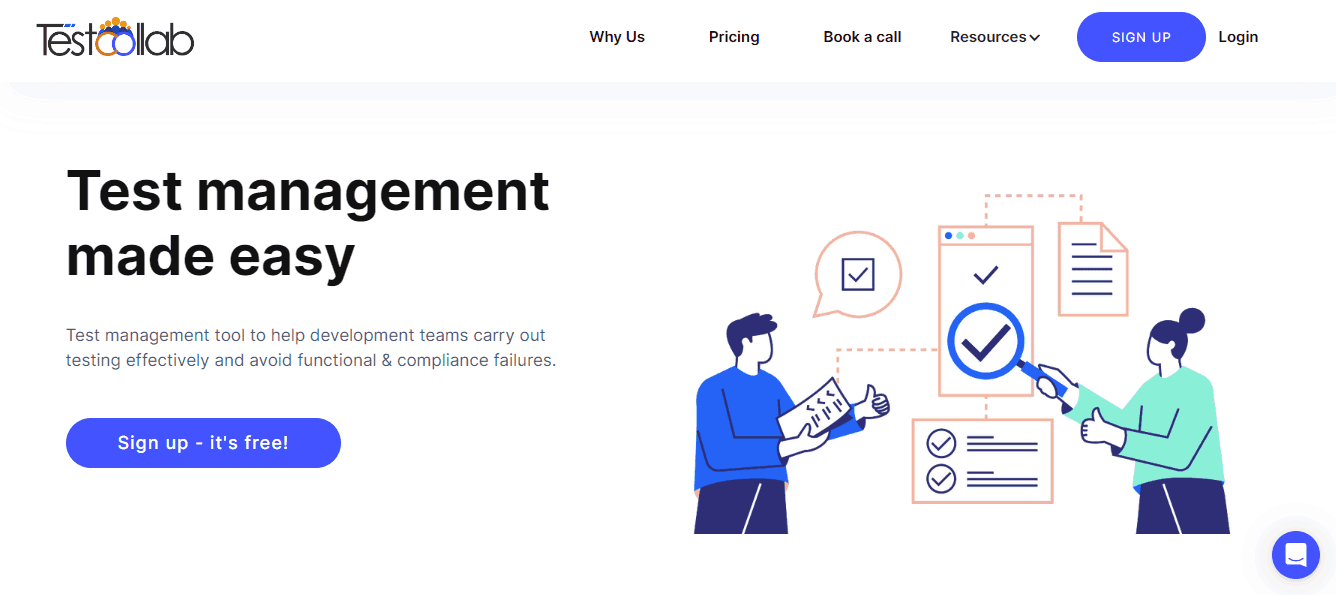
The key features of the TestCollab free test management tool are:
- It can centralize all test cases, plans, requirements, and conversations in the unified hub.
- It offers an automatic work assignment feature, streamlining work distribution and allocating more time to testing tasks.
- It allows the customization of fields and tags to suit the unique workflow of each project.
- It permits the creation of up to 200 test cases and the execution of 300 tests for test cycles in the free plan.
- It enables the creation of test suites, scheduling through test plans, and monitoring reports.
- It allows reporting bugs in Jira from TestCollab, with tracking limited to defects only.
Swing2App
Swing2App is a free test management tool and a no-cost mobile app builder without coding. Its user-friendly drag-and-drop editor simplifies the process for businesses lacking mobile developers, enabling them to construct a new application effortlessly. It further allows users to import data from their existing website, creating a professional-looking mobile app version.
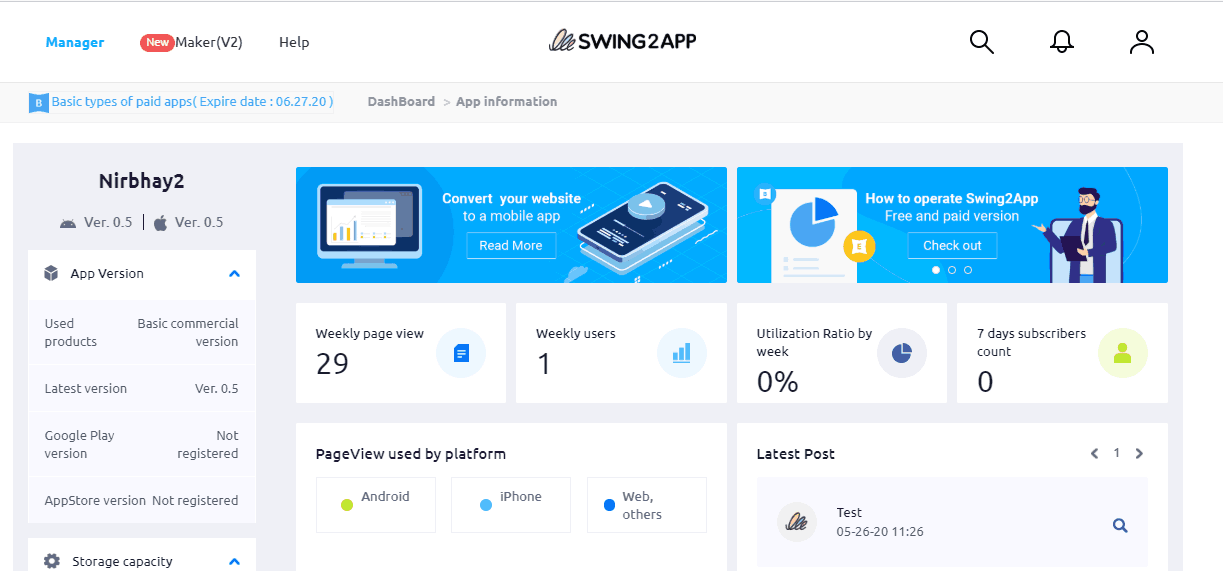
The key features of the Swing2App free test management tool are:
- It includes an authoring tool with configurable templates. Users can personalize apps with custom colors, themes, and user interfaces (UIs).
- It offers content editing tools that help developers add or remove content in real-time.
- It offers various features, including posts, multiple chat rooms, submission to official app stores, custom domains, version tracking, and more.
- It can efficiently manage push notifications and memberships through the administrator portal.
- It uses the AWS cloud infrastructure system, ensuring daily data backups, secure handling of app users’ information, and encrypted data transfer using HTTPS.
Selenium
Selenium is an open-source automation testing tool for performing web application testing. It is well-known for its different functionalities, which include test case management, bug tracking, and reporting. It is one of the popular tools that offers cost-effective solutions for automating web-based applications.
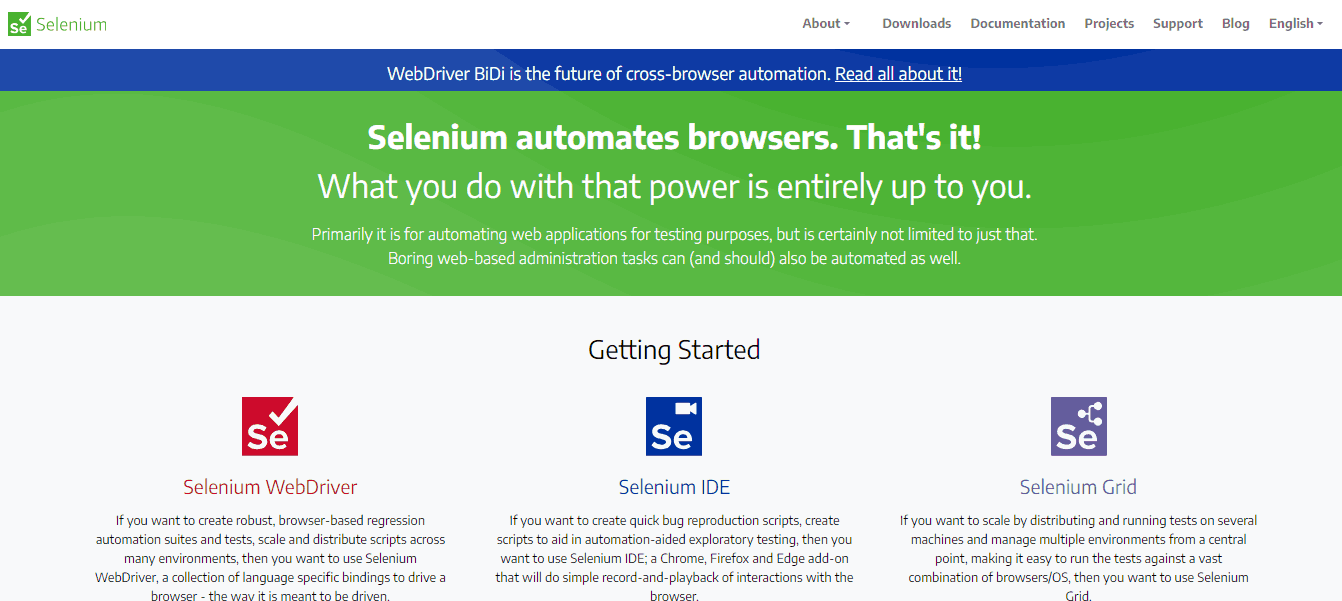
The key features of the Selenium free test management tool are:
- It supports automation in web browsers like Chrome, Firefox, and Edge.
- It supports multiple programming languages like Java, Python, C#, Ruby, and Perl.
- It extends its testing capabilities to mobile and web-based applications by emulating a mobile device through a web browser.
- It proves valuable in performance testing of web applications, assessing factors like page load times, handling requests per second, and monitoring memory usage.
- It empowers parallel execution of test cases, reducing execution time and enhancing overall efficiency.
Watch the video tutorial below to start with Selenium 4 and its functionalities. You will get detailed insights into how Selenium works, its architecture, and various new functionalities.
 Note
NoteRun your Selenium tests across 3000+ browsers and OS combinations. Try LambdaTest Today!
Appium
Appium is an open-source mobile app testing tool for native, hybrid, and mobile web applications. It is free to use, and you do not need to download or install it on your devices. Appium manages all your testing activities well and is compatible with most other testing frameworks.
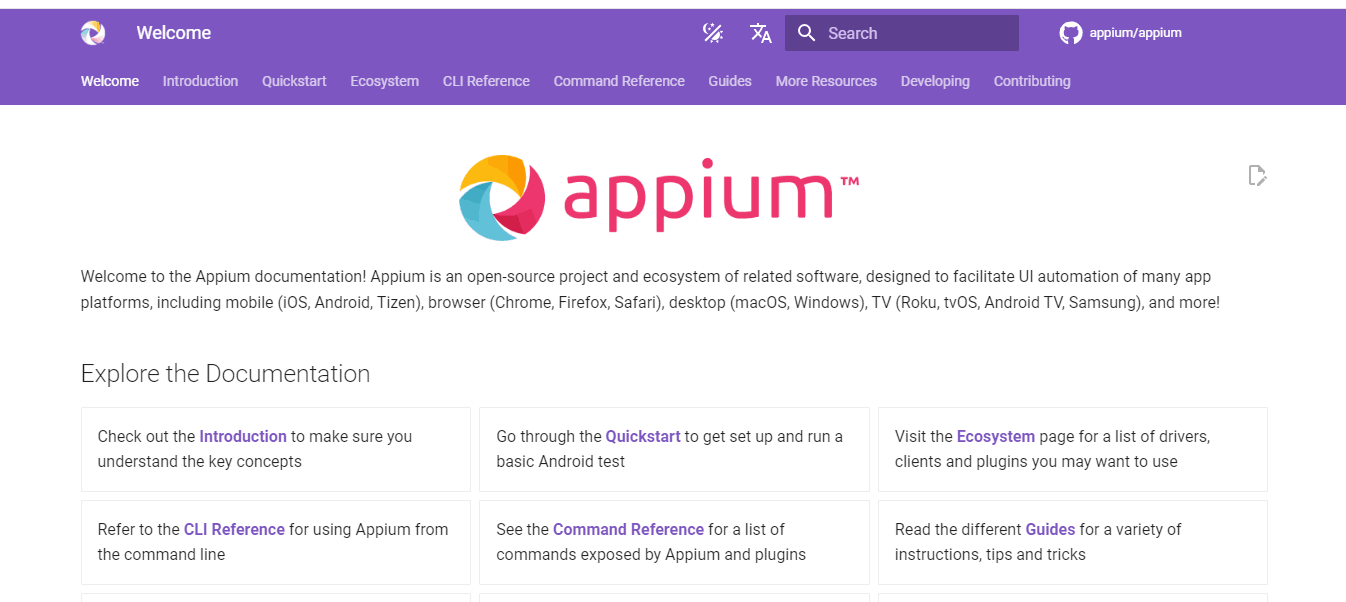
The key features of the Appium free test management tool are:
- It automates your test process and provides a unified framework for managing test cases and exploratory test sessions.
- It helps the creation of test scripts that function seamlessly on both iOS and Android applications.
- It supports multiple programming languages, accommodating users proficient in Java, Python, C#, or other languages.
- It uses a unique testing technique by simulating user interaction with the app.
- It establishes a continuous and efficient testing pipeline by automating the testing step and instantly triggering tests when code changes occur.
- It simplifies locating and testing your app through Appium Inspector.
TestLink
It is a free test management tool that allows you to manage users and create test plans and cases. It also helps monitor test progress and resit through reporting and statistics.
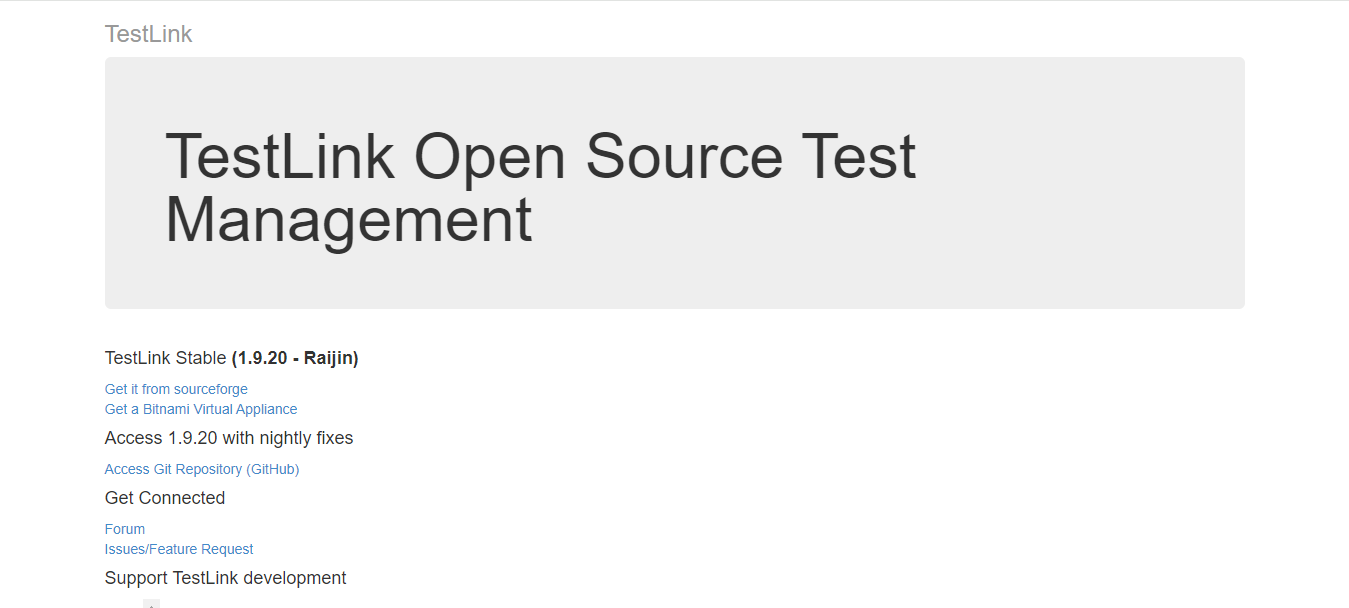
The key features of the TestLink free test management tool are:
- Its open-source allows testers to write test cases according to their specific requirements.
- It facilitates user management, monitors test progress and results through various statistics and reports, and creates test plans and executes test cases.
- It provides a straightforward and user-friendly approach for exporting and importing test cases.
- It offers a seamless and uncomplicated method for assigning test cases to multiple users.
- It enhances insight into test execution through the intuitive and interactive dashboard panel designed for manual testing.
- It easily integrates with multiple defect management and other tools, such as Selenium, Jira, TeamForge, and Visual Studio.
QuAck
It is a free test management tool that enables the centralized management of test cases through a comprehensive tool suite. This tool operates on a REST-API foundation, allowing users to perform all actions in the user interface through the API. QuAck features a test suite with preset filters and groupings, offering flexibility to rebuild test suite trees.
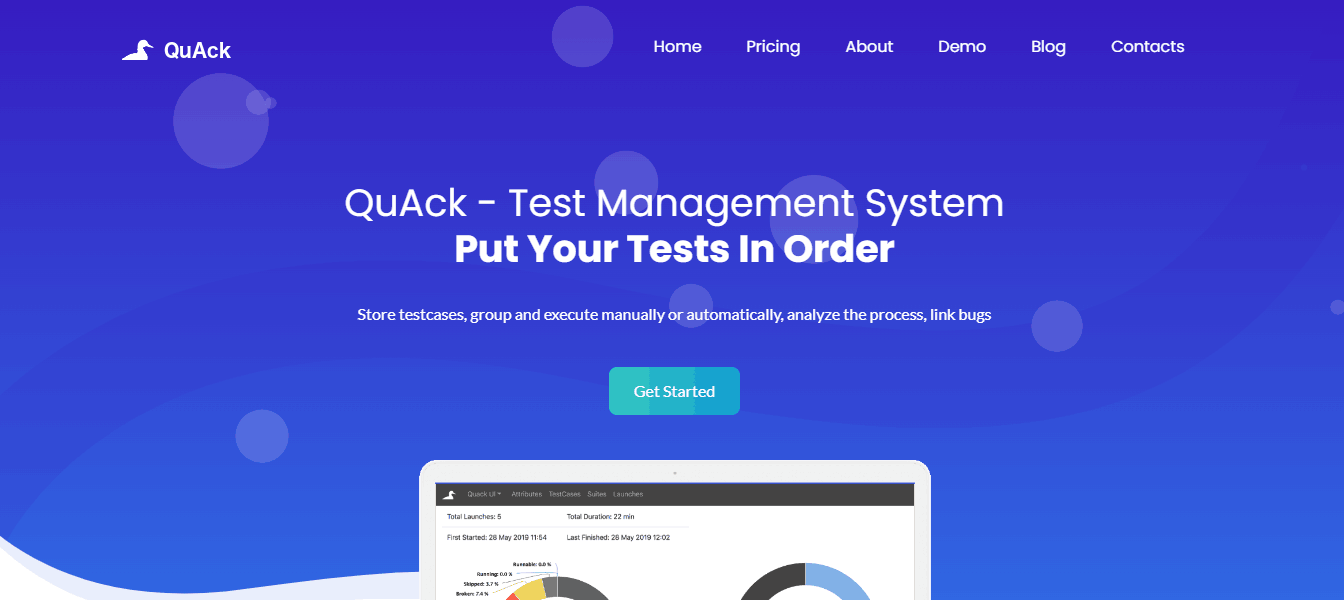
The key features of the QuAck free test management tool are:
- It integrates all test cases, test suites, and test launches within a software project.
- It ensures the separate and independent existence of all entities in your project, eliminating intersections.
- It enables each entity to have its configuration, including permission restrictions, facilitating the customization and organization of your project with distinct entities.
- It easily integrates with bug-tracking tools like Bugzilla and project management tools like Jira.
- It facilitates the upload of autotest definitions and results, enhancing the overall functionality of the tool.
Testopia
It is another popular free test management tool that is actually an extension of Bugzilla. This tool is known for tracking test cases that eventually allow integration of bug reporting with the test case run results. While initially customized for software testing, it extends its utility to tracking testing activities across diverse domains within the engineering process.
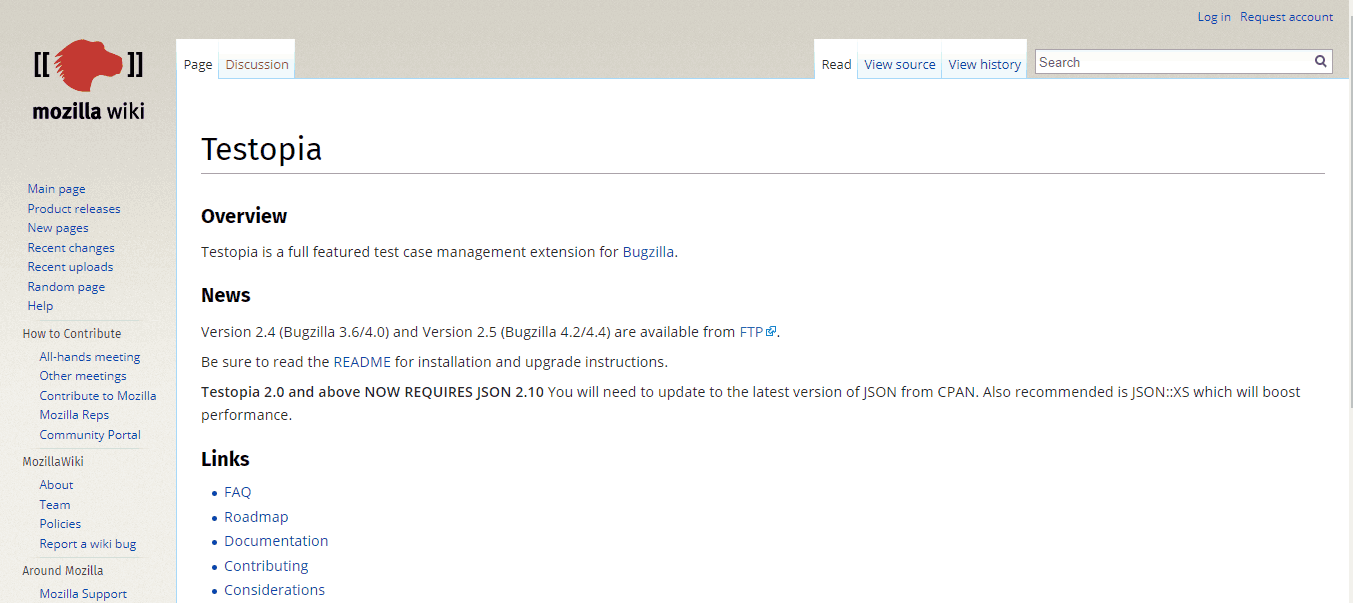
The key features of the Testopia free test management tool are:
- It enables XML export and import of test plans and their components.
- It allows for CSV export of test cases and results.
- It introduces new reports such as worst offender and case roll-up, enabling the distribution of reports to stakeholders and clients without the necessity of live demonstrations.
- It permits the setting of priorities on individual case runs.
- It empowers users to generate personalized test case reports and monitor the progression of regular and release-based testing.
- It enables priority assignment on an individual case run.
- It integrates with Jenkins and chat applications like Slack.
Nitrate
Nitrate is a new free test management tool for managing test plans, test runs, and test cases, developed using Python and Django, the Python web framework. It is mainly for Agile and development teams; Nitrate offers extensive features, including automation, access control, and reporting. Nitrate’s automation process permits referencing specific test scripts in the script field of your test case. Subsequently, your test runner extracts information via Nitrate’s API, leading to the creation of precise test runs and an enhancement of testing activities.
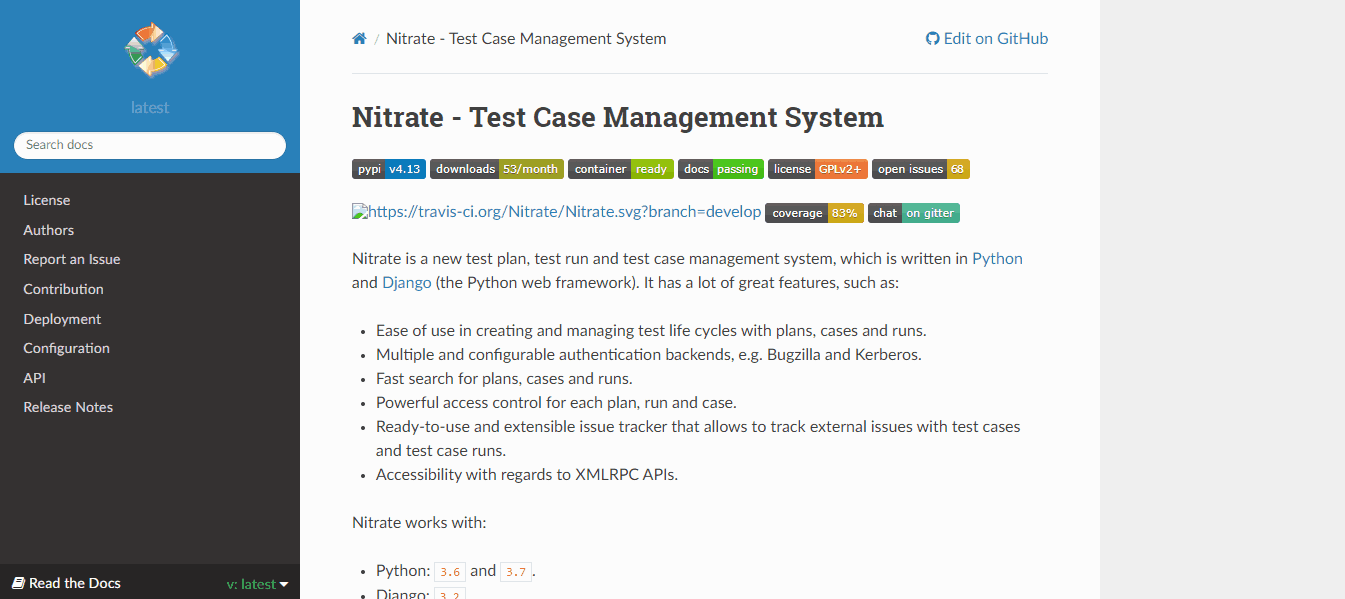
The key features of the Nitrate free test management tool are:
- Its user-friendly interface allows for creating and managing test life cycles encompassing plans, cases, and runs.
- It supports multiple and configurable authentication backends, including Bugzilla and Kerberos.
- It offers rapid search functionality for plans, cases, and runs.
- It provides robust access control mechanisms for each plan, run, and case.
- It is equipped with a ready-to-use and extendable issue tracker, enabling the tracking of external issues associated with test cases and test case runs.
- It ensures accessibility through XMLRPC APIs, contributing to the overall usability of Nitrate.
TestCaseDB
TestCaseDB is a test case management application developed on the Ruby on Rails framework. It is an open-source project management tool with a user-friendly interface for creating, updating, and tracking test cases and plans. It enables the setup of an SQL database and seamlessly collaborates with tools like Jira, which is commonly used in QA teams.

The key features of the TestCaseDB free test management tool are:
- It features a robust test automation framework, allowing users to navigate test cases and easily complete test runs.
- It enables users to execute tests directly from the TestCaseDB server and track existing automation using the API.
- It integrates with Apache JMeter, allowing for control and analysis of performance testing.
- It is both a free and a fully open-source project management tool.
Specflow
SpecFlow is a free and open-source automation testing tool designed for .NET applications. It enables the incorporation of Behavior-Driven Development (BDD) approaches in test writing. It extends its support not only to .NET applications developed with the C# programming language but also includes compatibility with Xamarin and Mono frameworks within the .NET domain. The BDD approach enhances collaborative efficiency, ultimately reducing development time.
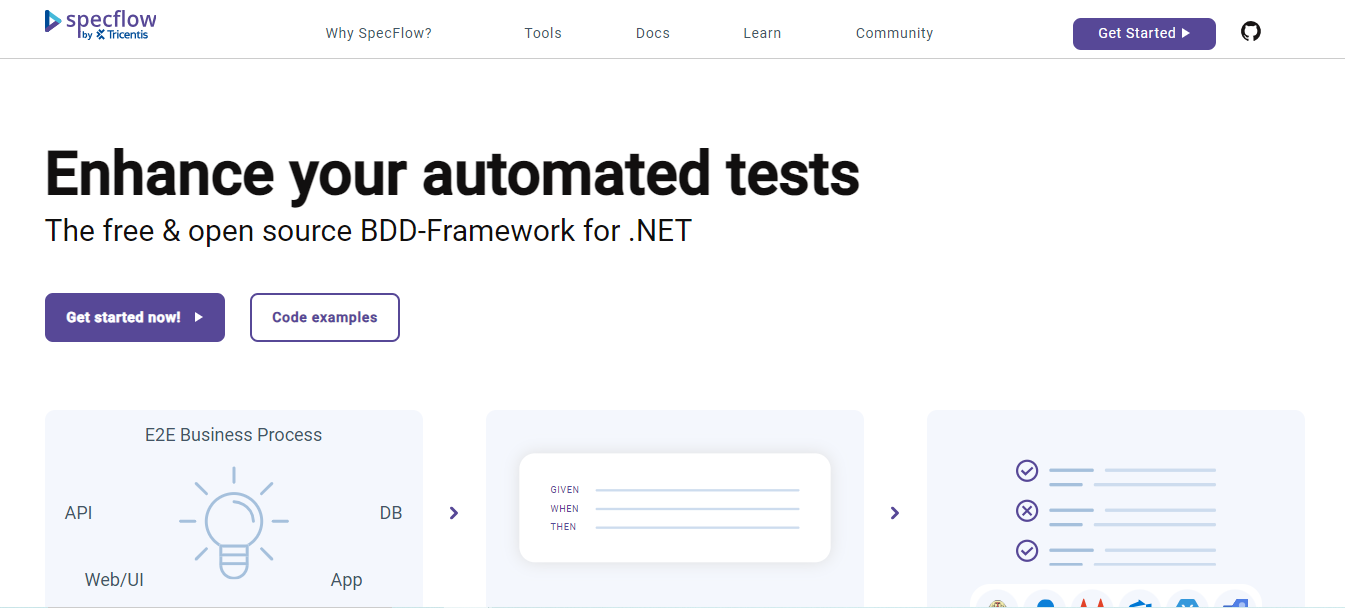
The key features of the SpecFlow free test management tool are:
- It is a BDD tool that utilizes natural language for test descriptions.
- It automatically generates comprehensive reports on test results, enabling teams to monitor testing progress and identify improvement areas.
- It integrates with various tools, including bug tracking and build management systems.
Robot Framework
Robot Framework functions as a versatile open-source test automation framework, offering a detailed, keyword-driven testing approach for automation.
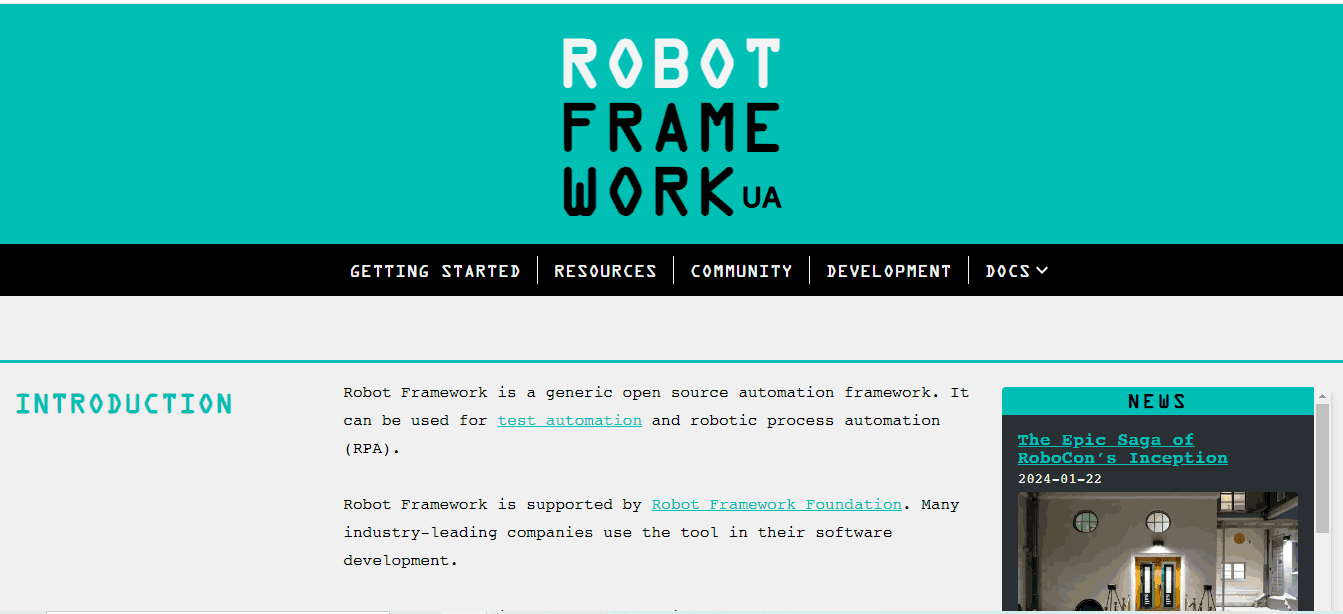
The key features of the Robot Framework free test management tool are:
- It features an uncomplicated syntax, employing human-readable keywords for ease of use.
- It includes a comprehensive set of built-in libraries that cover various testing aspects, such as HTTP, FTP, SSH, and XML.
- It extends its capabilities through libraries implemented in Python, Java, and other programming languages.
- Due to its modular architecture, it allows for extensions with additional libraries and tools.
You can also subscribe to the LambdaTest YouTube Channel and get detailed tutorials on Selenium testing, Cypress testing, Playwright, and more.
Testiny
Testiny is a rapidly advancing free test management tool developed using the latest technologies. It intends to streamline manual testing and QA management. It is user-friendly and allows testers to perform tests without adding unnecessary complexities to the testing process.
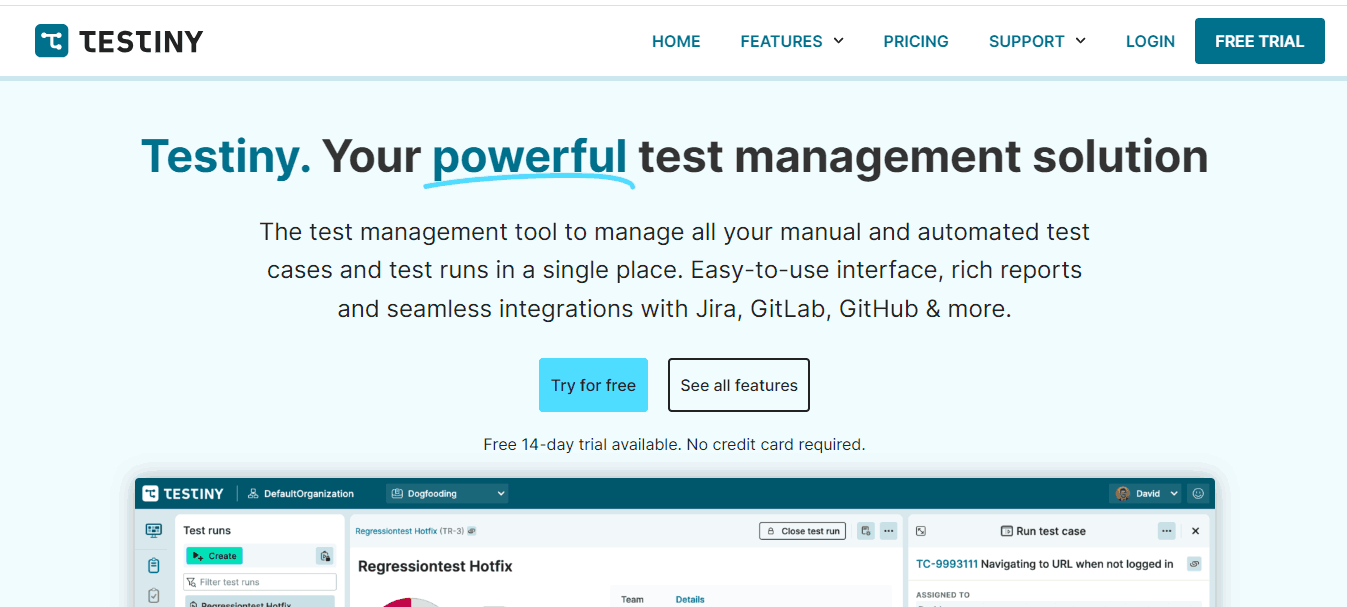
The key features of the Testiny free test management tool are:
- It benefits mid-size QA teams that aim to integrate manual and automated testing in the development process.
- It creates a well-organized test plan for effective test management of test runs that ensure that regression testing is well executed.
- It centralizes the management of both manual and automated tests in one location.
- It uses the runner to execute test runs and securely archive results. Analyze, track, view, and discuss your results efficiently.
TestFirst
TestFirst is a modern, cloud-based free test management tool that enhances the quality and productivity of your testing process. Its approach involves providing essential tools to your testing and development teams and supporting them in their core activities.
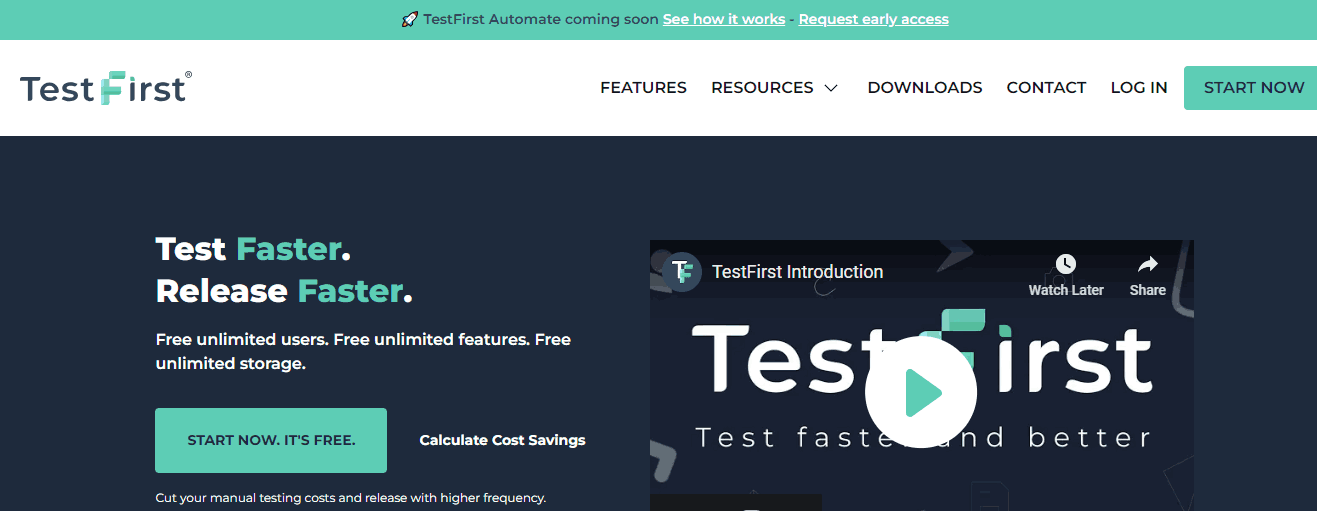
The key features of the TestFirst test management tool are:
- It utilizes a test execution module to execute manual tests at a speed four times faster.
- It enhances manual execution speed through features like “automatic screenshot” and “cloud upload” in the test execution module.
- It allows you to add and annotate screenshots five times faster than the Annotation Module.
- It enhances your writing speed with the Exploratory Testing Module, ensuring comprehensive test case coverage without delays.
Tuskr
Tuskr is a user-friendly, cloud-based, free test management tool with a straightforward UI that is easy to navigate. Its WYSIWYG editor allows for rich-text formatting, making creating and managing test cases simple. Tuskr’s scalability across large projects and organizations is effortless, allowing users to create test runs that include all test cases in a project, specific ones, or those that match a complex filter.
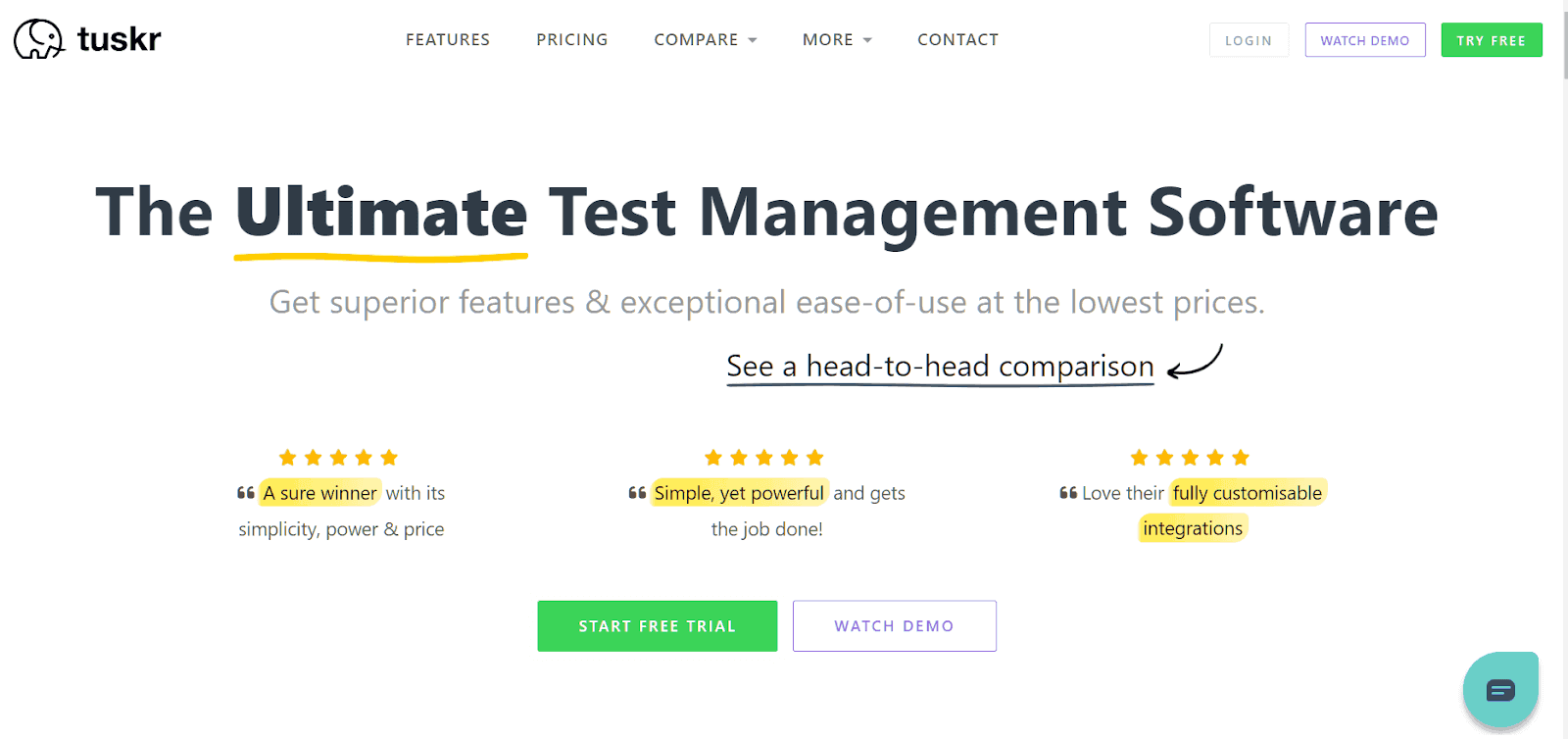
The key features of the Tuskr free test management tool are:
- It can effortlessly scale for large projects and organizations, making it suitable for teams of all sizes.
- It offers custom fields for recording results and custom result statuses that can be tailored to suit your business needs.
- It allows for quickly adding results or reassigning test cases, saving users time and effort.
- It offers custom fields for recording results and custom result statuses that can be tailored to suit your business needs.
- It allows quickly restoring accidentally deleted projects, test suites, or test runs.
- It provides logs that enable users to track changes made to the system quickly.
Xray
Xray is a free test management tool that offers real-time indexing of tests to track all your tests effectively. It provides smart orchestration and native integration with popular frameworks such as Cucumber and JUnit, allowing easy testing management across large codebases. It supports both manual and automated tests.
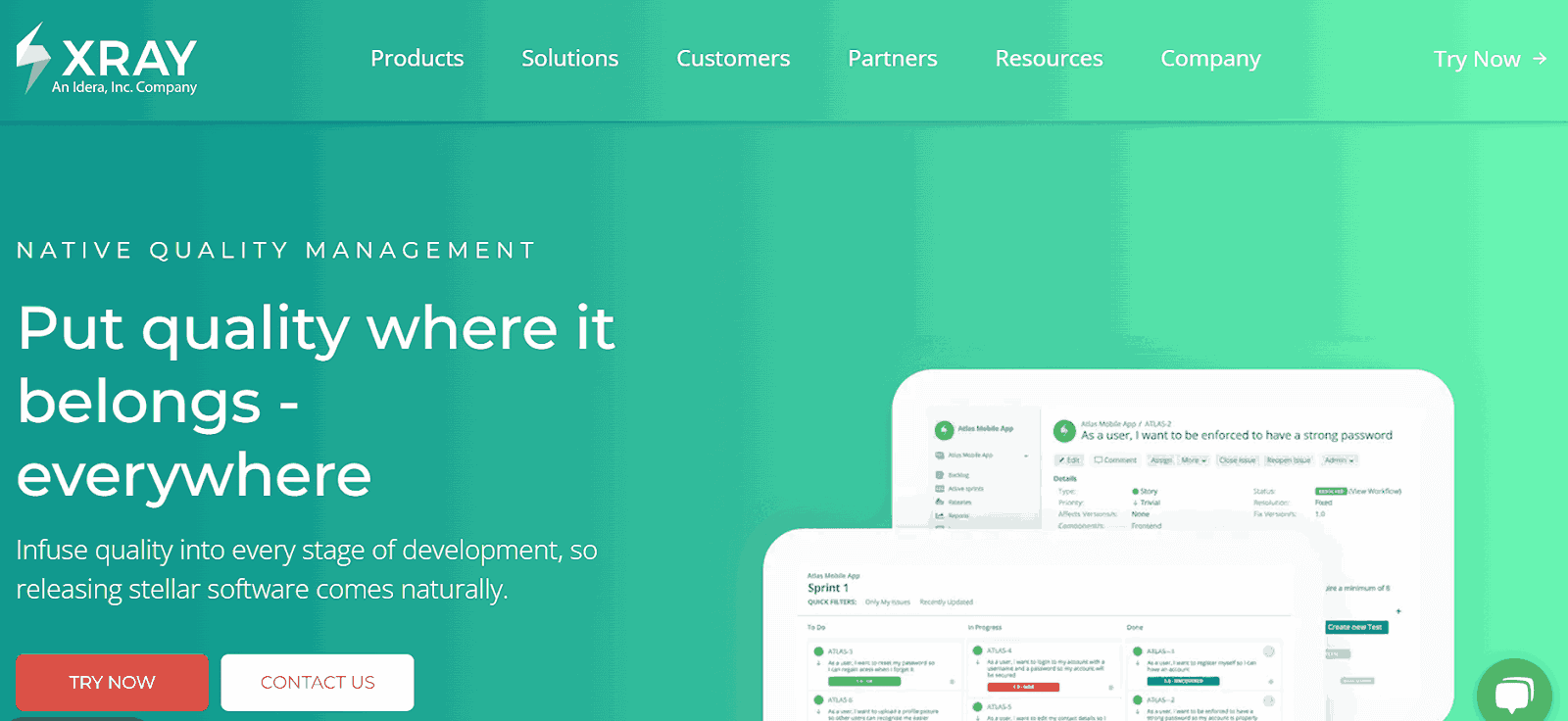
The key features of the Xray free test management tool are:
- It offers real-time indexing of tests for effective test tracking.
- It provides smart orchestration for managing testing across large codebases.
- It offers native integration with popular frameworks like Cucumber and JUnit.
- It supports both manual and automated tests.
- It provides a REST API for tracking automation results in Xray and Jira, ensuring up-to-date information.
- It is trusted by large-scale clients like Lufthansa, Vodafone, and Samsung for demanding testing projects.
- It offers flexible pricing options based on the number of Jira users, with Server, Data Center, and Cloud categories available to meet the needs of organizations of all sizes.
Klaros
Klaros is a versatile free test management tool offering multiple configurations to accommodate different testing needs. It focuses on reducing maintenance costs by promoting reusable test procedures.
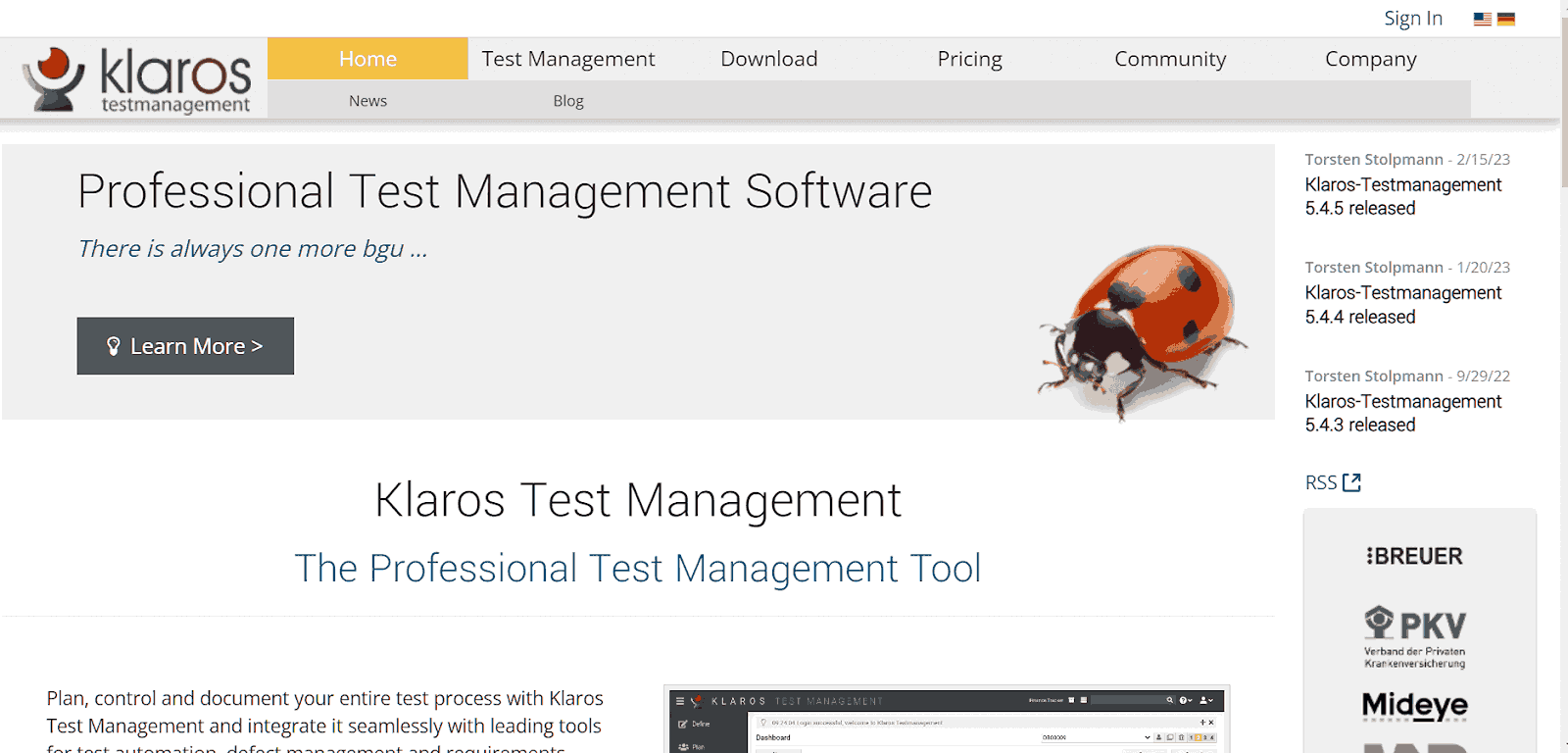
The key features of the Klaros free test management tool are:
- It consolidates and evaluates manual and automated test cases.
- It monitors test activities for workload, progress, and success.
- It integrates errors found during test execution with the defect management system.
- It provides a customizable dashboard offering a quick overview of critical reports and statistics.
- It allows hierarchical organization of tasks, scheduling of reviews, creation and tracking of issues and defects, and application of test case results from automation tools and continuous integration servers.
- It enables the export of results to Excel, PDF, or XML for further processing.
- It is available in the free Community Edition and the Enterprise Edition.
How to Select the Right Free Test Management Tools?
You must consider certain factors and features to choose the best free test management tools. Some of those are mentioned below.
- You must look for a test management tool with features like test case management, defect tracking, and bug reporting.
- You must select a testing tool that has a clean and user-attractive interface.
- You must check the usability of the test management tool. It means it is important to see whether the tool’s use is easy and check for its tech support, user support, and tutorials.
- You must check if the selected tools allow you to create and record test cases, test plans, and test runs.
- You must opt for a tool supported by a huge and engaged community of users.
- You must verify if the chosen test management tool supports different forms of testing like automation, integration, continuous, and manual testing.
A free test management tool with integration capability can save much testing time. However, many test cases can complicate the test management process in complex applications where the issue needs to be mimicked in real-world conditions on various platforms.
According to the Future of Quality Assurance survey, 18.09% of testers spend time maintaining test infrastructure and managing other testing tools. The primary challenge software testers and teams encounter is selecting the right test management tool for their software project. This challenge can be mitigated through the right tooling, such as LambdaTest, which helps cut down test execution times, thereby reducing test monitoring requirements and eliminating time spent on maintaining testing tools and scaling up test infrastructure.

To address this challenge of running tests on various cloud-based platforms, as mentioned earlier, LambdaTest is one of the best options. With this platform, you can also integrate the other test management tools, which allows you to export test results and view them in a unified platform.
Organizations can achieve quicker developer feedback and expedite their go-to-market strategies by utilizing the potential of cloud-based test execution. Additionally, users can leverage the power of the online Selenium Grid for automated browser testing across various browsers and OS configurations for websites and web applications.
Conclusion
Considering the diverse range of features provided by the mentioned free test management tools, it becomes evident that selecting a test management tool on a larger scale demands careful consideration of multiple factors. Many tools address the evolving requirements of organizations by offering scalability, integration capabilities, and robust reporting and analytics features in the context of testing. It is crucial to assess the specific needs of a software project and choose a tool that aligns with those requirements. Additionally, experimenting with different tools before deciding is essential, as it allows finding the one that best suits your needs. Hence, open-source test management tools present a compelling option for organizations seeking an accessible, adaptable, and controlled solution for test management.
Frequently Asked Questions (FAQs)
Why do I need a test management tool?
Test management tools help streamline testing workflows, improve collaboration, track testing progress, and ensure the delivery of high-quality software.
How does integration with other tools benefit test management?
Integration with tools like bug trackers, CI/CD systems, and test automation frameworks enhances efficiency, communication, and collaboration within the testing process.
What role does scalability play in choosing a test management tool?
Scalability is crucial to accommodate growing testing needs, ensuring the tool can handle increased test cases, users, and projects.
Can test management tools generate reports on testing progress?
Yes, most test management tools offer reporting features, allowing users to generate detailed reports on testing progress, results, and overall project status.
Got Questions? Drop them on LambdaTest Community. Visit now


